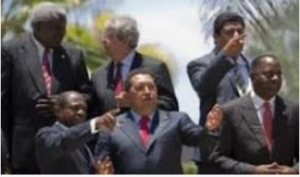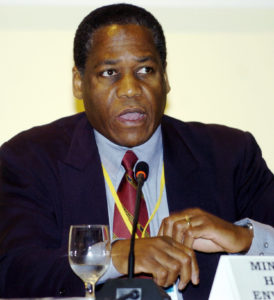On Wednesday, Caribbean Net News reported that Grenada and Dominica are the latest Caribbean countries to sign up for PetroCaribe. That, of course, is the energy/economic pact Venezuelan President Hugo Chávez is touting as a “Bolivarian Alternative” to the Free Trade of the Americas (FTAA).
 If one buys Chávez’s sales pitch, PetroCaribe promises to:
If one buys Chávez’s sales pitch, PetroCaribe promises to:
…contribute to the energy security, socioeconomic development and integration of the Caribbean countries, through the sovereign use of the energy resources.
I am loath to suggest that Chávez is selling snake oil instead of the crude oil that is supposed to fuel this pact. But I have grave misgivings about the viability of PetroCaribe as a reliable source of “discounted” energy for Caribbean countries.
Except that I have no standing. Therefore, I shall cite similar misgivings Bahamian Minister of Energy and Environment Dr. Marcus Bethel voiced during a Senate debate on the 2006/2007 budget. Here is how he explained his government’s decision to look this gift horse in the mouth:
Whereas such a line of credit would benefit the Bahamas in short term outlay of capital and infrastructural development programs, there exists some operational infrastructure challenges that would prohibit early implementation of such an agreement.
(The Nassau Tribune, March 16, 2006)
Dr. Bethel’s deft (technical) explanation suffices as plausible diplomatic cover for any country disinclined to join PetroCaribe. But I feel obliged to expound on its plain meaning:
 I have often lamented the failure of Caribbean countries to implement the Caribbean Single Market and Economy (CSME) agreement. And it just so happens that I often cite the Bahamian government’s imperious, parochial and self-interested approach to regional negotiations as a major contributing factor.
I have often lamented the failure of Caribbean countries to implement the Caribbean Single Market and Economy (CSME) agreement. And it just so happens that I often cite the Bahamian government’s imperious, parochial and self-interested approach to regional negotiations as a major contributing factor.
This puts Dr Bethel’s we’re-interested-but assessment of PetroCaribe’s value into perspective. In truth, though, it is just one of many regional governments that seem congenitally averse to regional economic integration. Each seems pathologically confident in its ability to negotiate bilateral agreements that offer far greater benefits than any regional agreement ever could.
But, as wrong as The Bahamas might be on CSME, it is right on PetroCaribe. Indeed, anyone who reads the fine print in this Chávez pact will see that it’s more about regional politics than regional energy.
Other regional governments are propagating the pitch that PetroCaribe will deliver cheap fuel for local consumption. But their citizens are bound to be sorely disappointed, respectively. Because there’s nothing in this agreement that provides such a guarantee.
Of course, this is not to say that the initiative is utterly devoid of benefit for Caribbean countries. For example, former Jamaican Prime Minister PJ Patterson reportedly leveraged his influence to get other Caribbean leaders to sign on to PetroCaribe so that he could extract concessions from Chávez for PetroJam – a $500 million in funding to upgrade Jamaica’s oil refinery.
Nonetheless, Caribbean countries should be mindful of this pact’s significant geopolitical implications. Not least because Chávez clearly sees it as a means of consolidating the political alliance he forged last year when he got Caribbean countries to abandon their traditional deference to the United States in order to support his candidate for president of the Organization of American States (OAS).
The more intriguing dynamic afoot, however, is the extent to which Chávez is acting in concert with Venezuela’s new political patron, China. Because it is undeniable that, even more than he, Chinese leaders have been strategically buying up political influence throughout the Caribbean and Latin America in recent years. Except that the Soviet Union saw Fidel Castro as a useful idiot to antagonize America in its own backyard. But China sees Chávez as a useful conduit to help satisfy its economic needs at home (oil!).